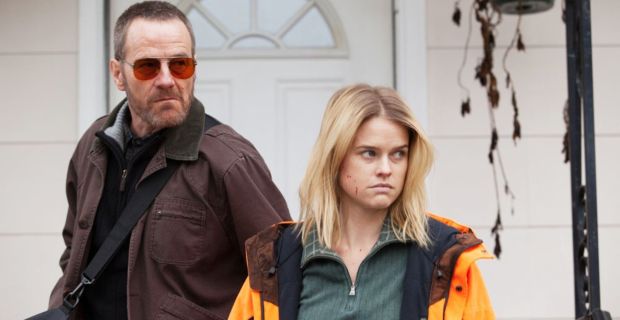
Film: Cold Comes The Night
Directed By: Tze Chun
Written By: Tze Chun, Oz Perkins, Nick Simon
Starring: Alice Eve, Bryan Cranston
Cold Comes the Night may as well be called Cold Comes the Nought for all that comes of it. This is an unrelentingly dull snoozefest, populated entirely by the kind of bleak, violent Midwestern stereotypes that dominate every miserable small town indie you’ve ever seen. Presumably setting out to be a hard-hitting drama about hopelessness and desperation, it lacks both character and urgency, recycling overly familiar personality tropes in a narrative that’s utterly inconsequential. It’s less a film than a template for one, with a story that would be worth telling were it able to choose an actual conduit for events and invested with some degree of affection.
Chloe (Alice Eve) is a put-upon single mother who runs a seedy motel on the outskirts of a small town. One evening, an aloof Polish man named Topo (Bryan Cranston) checks in, his dark eye glasses concealing the fact he’s almost blind. After an altercation with a prostitute leads to his accomplice being killed and their vehicle being impounded by the police, Topo takes Chloe and her daughter hostage, ordering her to act as his eyes in retrieving a stash of money from the vehicle.
It’s probably worth pointing out from the off that – as sacrilegious as this sounds in a post-Breaking Bad world – one of the biggest problems with Cold Comes the Night is how woefully miscast Bryan Cranston is as Topo. His accent evokes more of Russia than of its near neighbour, but even aside from that the actor’s ferocious intensity is nowhere to be found in a character that may as well be a cardboard cut out. Cranston dutifully rolls his r’s and pitches a menacing stare, but in a film as utterly devoid of substance as this he comes across as a caricature. There’s no urgency or even any real drama to Cold Comes the Night, but perhaps more damningly, there’s a very real lack of heart. Eve’s Chloe bears all the hallmarks of a readily sympathetic character – she’s a penniless single mother and possible former prostitute, cornered to circumstance by a crooked cop (Logan Marshall-Green) on one side and social services threatening to take her child from her on the other. Her desperate struggle to escape the violence and decay of her world should bring pathos to this savage set-up, but instead she comes across as the coldest presence onscreen. Eve herself is admirable and earnest, doing her best to give Chloe resonance, but her efforts are a casualty of the lacklustre, half-hearted manner in which the story is realised. In many ways, this feels like the most bereft tale in the world – as underserved as the characters it portrays, it depicts a recognisably fraught and intimate danger, but is so callous in its execution that it repels rather than invests the viewer.
Much of this can be attributed to mediocre writing. Cold Comes the Night is photographed in persistently colourless tones, but the script does nothing to really involve us in the dead-end streets and depressive lives its figures inhabit. There’s an obvious melancholy to Chloe’s circumstances, but she’s a fragmented personality, and we get the barest of glimpses into her life. Everything is assumed and predictable, shades of past abuse hinted at but never evinced in a way that makes her more than a one-dimensional vehicle for suffering and neglect. Eve is forced to endure a conveyor belt of guilt, grief, hopelessness, and isolation, the ceaseless gloom of Chloe’s everyday existence underlining the desperation of her situation but offering little engagement. Without this, there’s little to be gleaned from her tense interactions with Topo, and nothing at all to give his later decisions meaning. Either one could have been the hero of this story, but both are so pitifully underserved that by the time it descends into a last half-hour of fisticuffs and hysterics (with a nod to Marshall-Green’s fine turn as the crazed cop), it feels more like a disjointed soap than any kind of drama.
Ultimately, Cold Comes the Night feels lovelorn. Not just for the grim realities of its world, but for the utter lack of attentiveness that seems to have been paid to its execution. These are characters whose stories could move and compel given the proper outlet, but while much is made of the darkness of the world, no one thought to root it in real human emotion. It’s a heartless and unrewarding piece that, despite all its horrors, will leave little impact on the viewer.
SCORE: D
Review written by: Grace Duffy
- David Fincher’s ‘Gone Girl’ Gets An Icy New Trailer - July 7, 2014
- SCENE & HEARD: ‘Jersey Boys’ - June 27, 2014
- MOVIE REVIEW: ‘Snowpiercer’ - June 21, 2014
